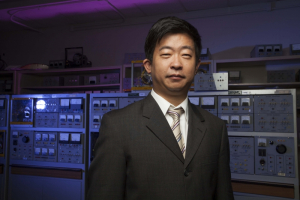Zhu Han's trophy case is getting crowded.
Since 2009 he’s won a National Science Foundation CAREER Award, an Excellence in Research and Scholarship award from the University of Houston, at least seven best paper honors at different international conferences, and even the Fred W. Ellersick Prize from the Communications Society of the Institute for Electrical and Electronics Engineers (IEEE), which honors the best paper published in any of the society’s journals during a three-year period.
Now Han, an associate professor of electrical and computer engineering with UH’s Cullen College of Engineering, has one more distinction to his name: IEEE Fellow. The honor is the IEEE’s highest grade of membership and is reserved for those with “an outstanding record of accomplishments” in an IEEE field. No more than one-tenth of one percent of IEEE’s voting members can be named fellows in a given year.
In naming Han to the 2014 Class of Fellows, the IEEE cited his contributions to resource allocation and security in wireless communications.
Indeed, Han is recognized around the world as an expert in these fields. His work on these topics has resulted dozens of peer-reviewed papers and co-authorship of five books, all published by Cambridge University Press.
In wireless communication, said Han, resource allocation means making the best use of a limited and increasingly crowded wireless spectrum. Given the sheer size of wireless networks and the volume of wireless traffic, top-down solutions are impractical. Instead, Han develops theories and algorithms that can be built into wireless devices and applied to individual wireless users.
“The network has become too big, so my expertise is in distributed optimization. Instead of centralized control, we design the rules that individual users operate under. These rules optimize how wireless resources are used. It’s basically game theory for resource allocation.”
In the realm of wireless security, Han develops solutions at practically every level of wireless communication. These include efforts to “fingerprint” individual devices based on their unique radio signals, new approaches to detecting malicious users, and encryption-based security measures.
Han’s work goes far beyond wireless communications, though. An expert in data processing, he applies this knowledge to smart grids – electrical grids that have built-in monitoring and communications systems for reporting power demand, usage, transmission data and more.
One of the biggest challenges in smart grids, said Han, is making sense of the huge amounts of data they generate. In the Houston area alone, the smart grid produces hundreds of millions of reports each day. Sorting through this pile of raw data to find valuable information and trends is a huge task.
In response, Han has established the Electric Power Analytics Consortium. The consortium is funded by energy industry firms and is dedicated to finding the best uses of smart grid data. Its first project covers an important issue, especially for cities like Houston that lie in hurricane zones: using smart data to determine how to restore power to the largest number of customers as quickly as possible following a widespread outage.
In his smart grid work as well his wireless research, Han says the IEEE plays an important role in developing new systems and technology.
“The IEEE is one of the largest and most important technical societies in the world,” he said. “Researchers everywhere rely on its conferences and publications to learn the latest findings in their fields and form the partnerships that help advance science and engineering. It’s an honor to be named a Fellow of such an important organization.”
